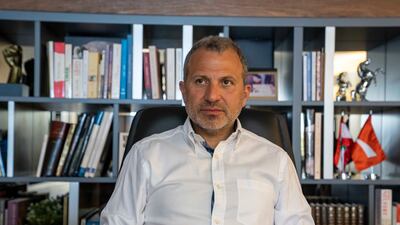As Lebanon faces the prospect of an expanded war with Israel, the country’s Maronite Christian community is going through transformations of its own. Its main political party, the Free Patriotic Movement (FPM) of former president Michel Aoun, is rapidly being transformed into the personal fiefdom of Mr Aoun’s son-in-law, Gebran Bassil. While less dramatic than a war, this development says a great deal about the Christian community’s politics in the country, and its direction.
In 1990, after Mr Aoun had declared a war of liberation against Syrian forces in Lebanon during the country’s civil war, he regularly made speeches to the throngs standing outside the presidential palace, from where he headed a military government. One of the themes he often repeated was that he sought a new, more egalitarian Lebanon, in which prominent sectarian leaders would no longer rule.
Coming from Mr Aoun, this made sense at the time. He himself was a child of the Lebanese periphery, who gained social promotion through the country’s military – sometimes, though not always, a rare example of meritocracy in the country. Yet when Mr Aoun rejected the Taif Accord of 1989, after Lebanon’s parliamentarians had voted in favour of it in Saudi Arabia, another facet of his character came to the forefront.
His rejection seems to have been motivated by the fact that the negotiations leading to Taif had not led also to his own election as president of the republic. This was despite the fact that he had significant Maronite Christian support, had begun his campaign in 1988 by closing down illegal ports, and seemed to embody a statist project against a decade and a half of wartime militia rule.
Mr Aoun was soon defeated by the Syrians and forced into exile. When he returned to Lebanon in 2005, he was received with great enthusiasm by his supporters. The political class’s efforts to contain him and form alliances to limit his success in parliamentary elections that year only boosted his appeal. Consequently, Mr Aoun secured the largest Christian bloc in Parliament.
From that moment on, Mr Aoun revived his old ambition of becoming president. He allied himself with Hezbollah, effectively breaking up the March 14 coalition that had opposed Syria in the aftermath of former prime minister Rafic Hariri’s assassination. This had obliged the Syrians to withdraw from Lebanon, allowing Mr Aoun to return.
Mr Aoun’s alliance with Hezbollah paid off when, in 2016, the party backed his presidency, even as his main Christian rival, Samir Geagea, did the same. Mr Aoun was elected in October 2016, and immediately sought to promote Mr Bassil, both in the government and in his own Free Patriotic Movement. In August 2015, Mr Aoun supported Mr Bassil’s elevation to FPM leader, without elections being held.
Since then, Mr Bassil has purged senior party members whose ties were to Mr Aoun, not to himself. In 2022, he expelled two FPM parliamentarians, Mario Aoun and Ziad Aswad, and most recently, he expelled Elias Abou Saab from the FPM-led parliamentary bloc. In a sign he was gaining in boldness, he recently kicked out Mr Aoun’s nephew Alain Aoun, leading another prominent FPM member, Simon Abi Ramia, to resign from the party.
While there is little that's surprising in Mr Bassil’s transformation of the FPM into a version of himself –what Mr Abi Ramia called “individualism” in his resignation speech – it does provoke several thoughts.
First, unlike most other Lebanese political parties, which are built around sectarian leaders, the FPM initially had a more interesting potential. Many parliamentarians of the group were people of note in their respective areas, not factotums of Mr Aoun. It appeared the FPM could become a gathering point for a mostly middle-class and lower middle-class electorate, was genuinely popular in Christian areas, and was also willing to cross sectarian lines.
Second, Mr Aoun’s past rhetoric portrayed the FPM as different than the sectarian elite against which Mr Aoun had railed in 1990. One couldn’t go too far, as the general could himself be very much a sectarian figure, but at least on the face of things the party’s constituency appeared to be less focused on sect than on a vision of the state to which its middle-class and lower middle-class supporters adhered.
Third, by removing prominent people from the FPM and intimidating the rest, Mr Bassil has taken what had been a fairly pluralistic party and turned it into one susceptible to becoming a gaggle of yes-men. That doesn’t apply to all its remaining leading members, but Mr Bassil’s message is clear: “Either work with my programme, or you’re gone.”
Fourth, in the short term, Mr Bassil’s controversial choices have alienated a significant number of voters, so that in the last elections of 2022, it was the rival Lebanese Forces Party that received a majority of Christian votes, not the FPM. As more FPM figures are forced out of the party, the party’s electorate will probably continue to be eroded.
That may not bother Mr Bassil, whose aim appears to be to create an organisation entirely loyal to himself. Yet all that this shows is how dysfunctional and undemocratic Lebanese politics has become, where retaining personal power is far more of a priority than presenting novel ideas that build constituencies.
In a way, Mr Bassil has only reinforced a sense that the Christian community remains a prisoner of the duality that led to its destruction in 1990, when the Aoun-led Lebanese Army fought Mr Geagea’s Lebanese Forces in a savage war that undermined the Maronites’ national power. The Aounists and Lebanese Forces are still around, and both are still dividing the Christian electorate.
Most disappointingly, Mr Bassil and Mr Geagea have sustained a political environment within the Christian community that leaves little room for dissenters. At a time when many Christian citizens seem to have given up on a unified Lebanese state, the community would gain by breaking out of the Aounist-Lebanese Forces headlock.


